(期末考点培优)专题07 句型转换-2024-2025学年七年级英语下册期末复习考点培优专项外研版(2024)(含答案解析)
文档属性
| 名称 | (期末考点培优)专题07 句型转换-2024-2025学年七年级英语下册期末复习考点培优专项外研版(2024)(含答案解析) |
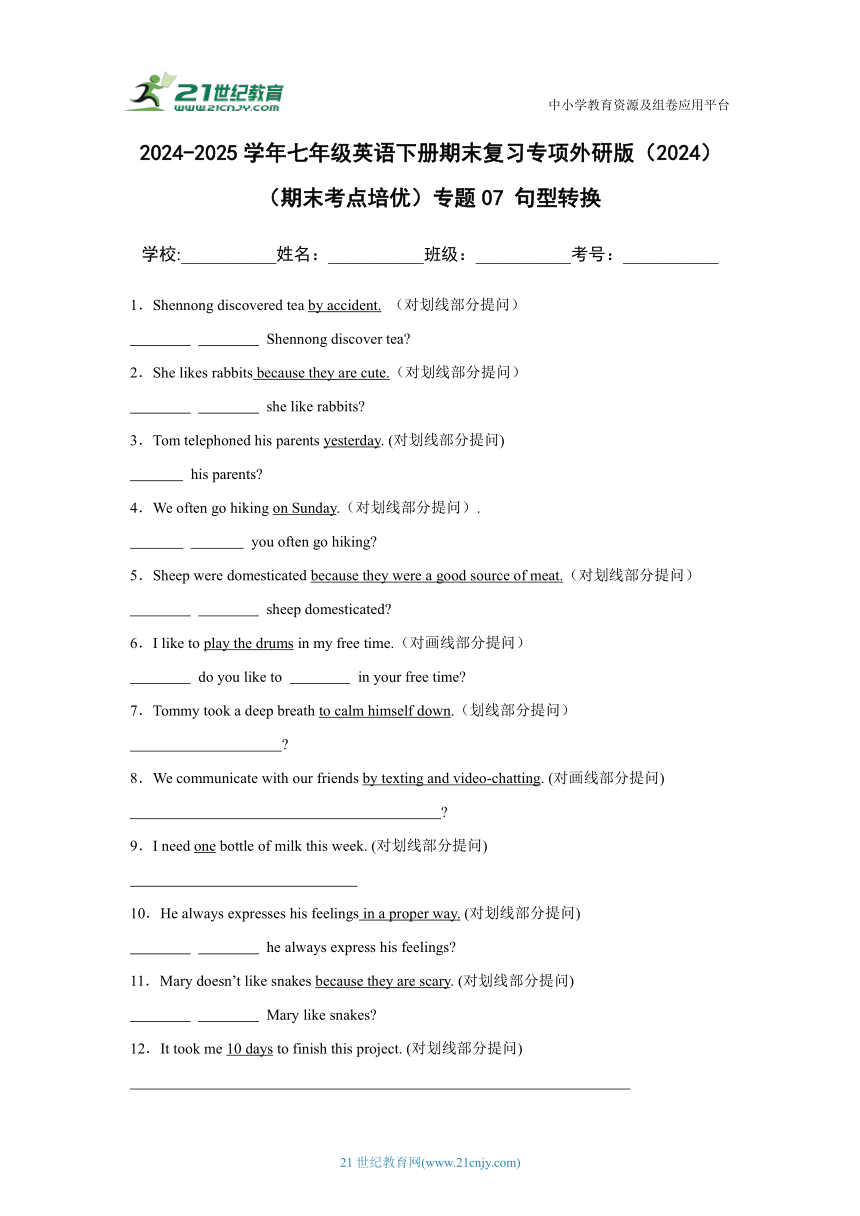
|
|
| 格式 | docx | ||
| 文件大小 | 59.9KB | ||
| 资源类型 | 试卷 | ||
| 版本资源 | 外研版 | ||
| 科目 | 英语 | ||
| 更新时间 | 2025-05-24 00:00:00 | ||
图片预览

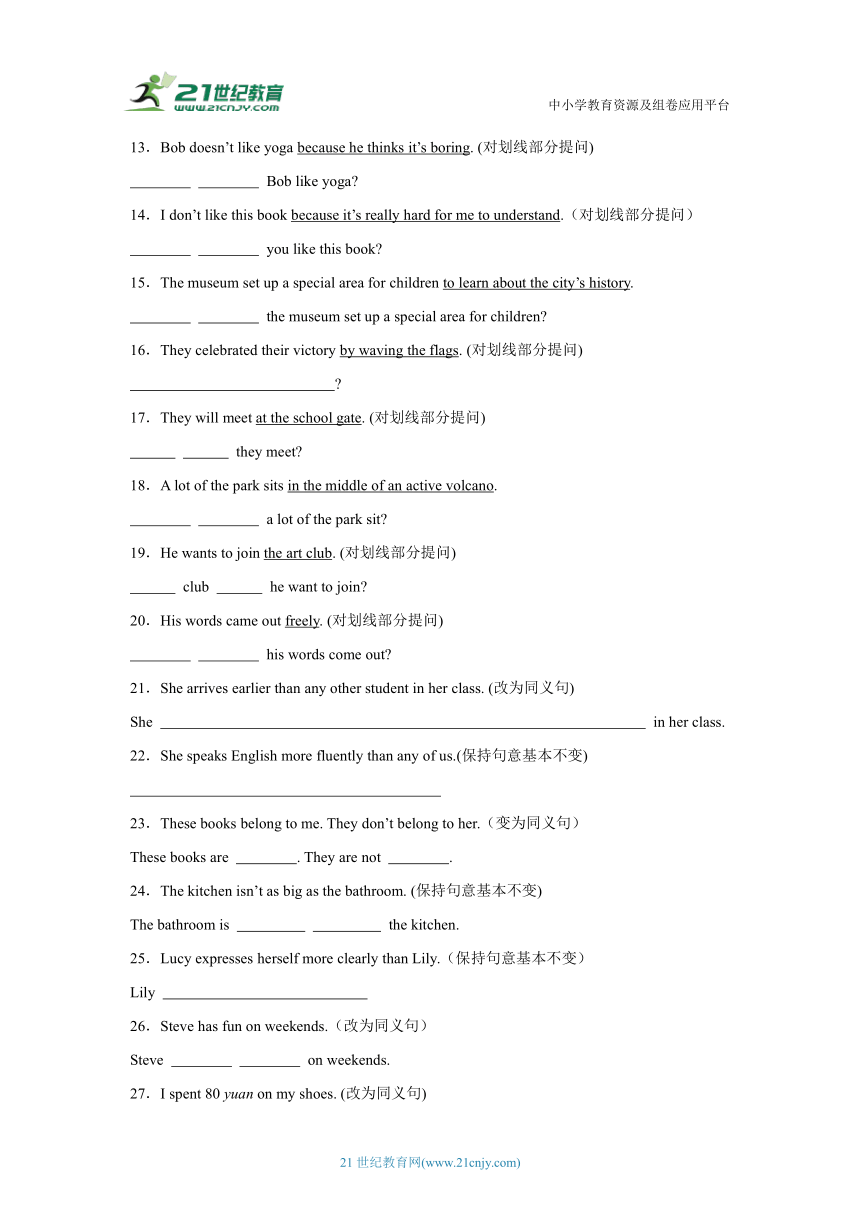
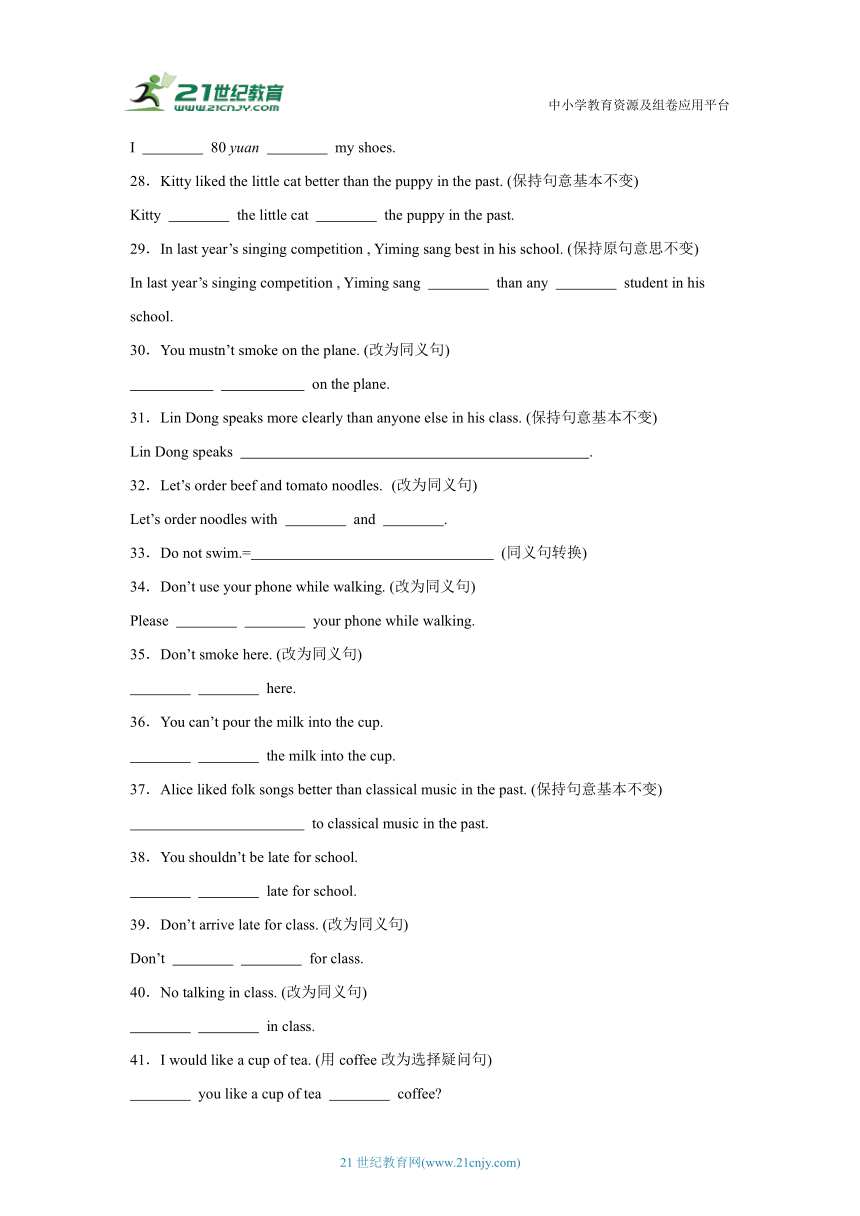
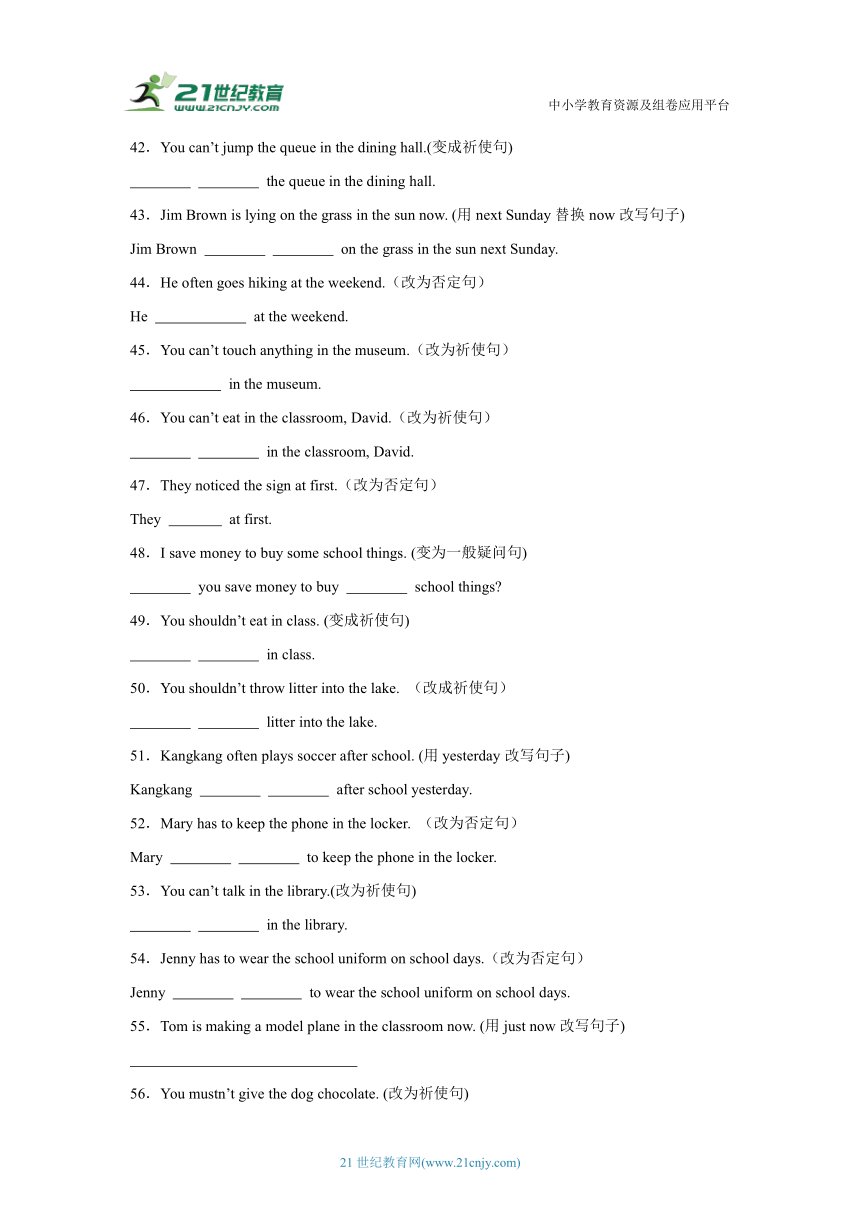
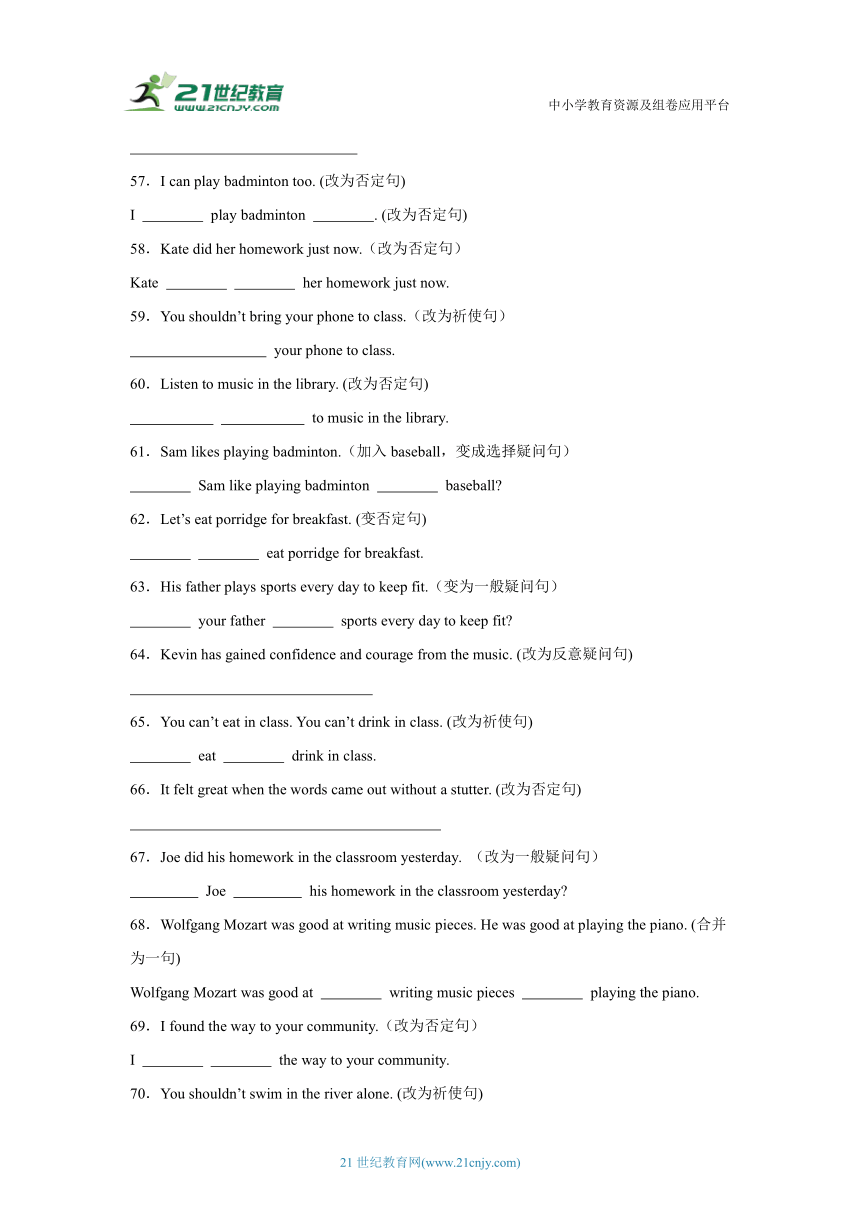
文档简介
中小学教育资源及组卷应用平台
中小学教育资源及组卷应用平台
2024-2025学年七年级英语下册期末复习专项外研版(2024)
(期末考点培优)专题07 句型转换
学校:___________姓名:___________班级:___________考号:___________
1.Shennong discovered tea by accident. (对划线部分提问)
Shennong discover tea
2.She likes rabbits because they are cute.(对划线部分提问)
she like rabbits
3.Tom telephoned his parents yesterday. (对划线部分提问)
his parents
4.We often go hiking on Sunday.(对划线部分提问).
you often go hiking
5.Sheep were domesticated because they were a good source of meat.(对划线部分提问)
sheep domesticated
6.I like to play the drums in my free time.(对画线部分提问)
do you like to in your free time
7.Tommy took a deep breath to calm himself down.(划线部分提问)
8.We communicate with our friends by texting and video-chatting. (对画线部分提问)
9.I need one bottle of milk this week. (对划线部分提问)
10.He always expresses his feelings in a proper way. (对划线部分提问)
he always express his feelings
11.Mary doesn’t like snakes because they are scary. (对划线部分提问)
Mary like snakes
12.It took me 10 days to finish this project. (对划线部分提问)
13.Bob doesn’t like yoga because he thinks it’s boring. (对划线部分提问)
Bob like yoga
14.I don’t like this book because it’s really hard for me to understand.(对划线部分提问)
you like this book
15.The museum set up a special area for children to learn about the city’s history.
the museum set up a special area for children
16.They celebrated their victory by waving the flags. (对划线部分提问)
17.They will meet at the school gate. (对划线部分提问)
they meet
18.A lot of the park sits in the middle of an active volcano.
a lot of the park sit
19.He wants to join the art club. (对划线部分提问)
club he want to join
20.His words came out freely. (对划线部分提问)
his words come out
21.She arrives earlier than any other student in her class. (改为同义句)
She in her class.
22.She speaks English more fluently than any of us.(保持句意基本不变)
23.These books belong to me. They don’t belong to her.(变为同义句)
These books are . They are not .
24.The kitchen isn’t as big as the bathroom. (保持句意基本不变)
The bathroom is the kitchen.
25.Lucy expresses herself more clearly than Lily.(保持句意基本不变)
Lily
26.Steve has fun on weekends.(改为同义句)
Steve on weekends.
27.I spent 80 yuan on my shoes. (改为同义句)
I 80 yuan my shoes.
28.Kitty liked the little cat better than the puppy in the past. (保持句意基本不变)
Kitty the little cat the puppy in the past.
29.In last year’s singing competition , Yiming sang best in his school. (保持原句意思不变)
In last year’s singing competition , Yiming sang than any student in his school.
30.You mustn’t smoke on the plane. (改为同义句)
on the plane.
31.Lin Dong speaks more clearly than anyone else in his class. (保持句意基本不变)
Lin Dong speaks .
32.Let’s order beef and tomato noodles. (改为同义句)
Let’s order noodles with and .
33.Do not swim.= (同义句转换)
34.Don’t use your phone while walking. (改为同义句)
Please your phone while walking.
35.Don’t smoke here. (改为同义句)
here.
36.You can’t pour the milk into the cup.
the milk into the cup.
37.Alice liked folk songs better than classical music in the past. (保持句意基本不变)
to classical music in the past.
38.You shouldn’t be late for school.
late for school.
39.Don’t arrive late for class. (改为同义句)
Don’t for class.
40.No talking in class. (改为同义句)
in class.
41.I would like a cup of tea. (用coffee改为选择疑问句)
you like a cup of tea coffee
42.You can’t jump the queue in the dining hall.(变成祈使句)
the queue in the dining hall.
43.Jim Brown is lying on the grass in the sun now. (用next Sunday替换now改写句子)
Jim Brown on the grass in the sun next Sunday.
44.He often goes hiking at the weekend.(改为否定句)
He at the weekend.
45.You can’t touch anything in the museum.(改为祈使句)
in the museum.
46.You can’t eat in the classroom, David.(改为祈使句)
in the classroom, David.
47.They noticed the sign at first.(改为否定句)
They at first.
48.I save money to buy some school things. (变为一般疑问句)
you save money to buy school things
49.You shouldn’t eat in class. (变成祈使句)
in class.
50.You shouldn’t throw litter into the lake. (改成祈使句)
litter into the lake.
51.Kangkang often plays soccer after school. (用yesterday改写句子)
Kangkang after school yesterday.
52.Mary has to keep the phone in the locker. (改为否定句)
Mary to keep the phone in the locker.
53.You can’t talk in the library.(改为祈使句)
in the library.
54.Jenny has to wear the school uniform on school days.(改为否定句)
Jenny to wear the school uniform on school days.
55.Tom is making a model plane in the classroom now. (用just now改写句子)
56.You mustn’t give the dog chocolate. (改为祈使句)
57.I can play badminton too. (改为否定句)
I play badminton . (改为否定句)
58.Kate did her homework just now.(改为否定句)
Kate her homework just now.
59.You shouldn’t bring your phone to class.(改为祈使句)
your phone to class.
60.Listen to music in the library. (改为否定句)
to music in the library.
61.Sam likes playing badminton.(加入baseball,变成选择疑问句)
Sam like playing badminton baseball
62.Let’s eat porridge for breakfast. (变否定句)
eat porridge for breakfast.
63.His father plays sports every day to keep fit.(变为一般疑问句)
your father sports every day to keep fit
64.Kevin has gained confidence and courage from the music. (改为反意疑问句)
65.You can’t eat in class. You can’t drink in class. (改为祈使句)
eat drink in class.
66.It felt great when the words came out without a stutter. (改为否定句)
67.Joe did his homework in the classroom yesterday. (改为一般疑问句)
Joe his homework in the classroom yesterday
68.Wolfgang Mozart was good at writing music pieces. He was good at playing the piano. (合并为一句)
Wolfgang Mozart was good at writing music pieces playing the piano.
69.I found the way to your community.(改为否定句)
I the way to your community.
70.You shouldn’t swim in the river alone. (改为祈使句)
in the river alone.
71.The ambulance took the old lady to the hospital after the accident.(改为一般疑问句)
the ambulance the old lady to the hospital after the accident
72.The variety of accents made it difficult to understand each other. (改为一般疑问句)
73.She had a heart attack. (改为否定句)
.
74.We can’t run in the hallways. (变为祈使句)
in the hallways.
75.You can’t swim in the river. (改为祈使句)
in the river!
76.You can’t take photos in the library. (改为祈使句)
photos in the library!
77.He describes how music has helped him. (改为否定句)
.
78.You can’t turn on the radio. (改为祈使句)
on the radio.
79.You can’t litter on the ground. (改为祈使句)
on the ground.
80.You can’t litter in the library. (改为祈使句)
in the library.
中小学教育资源及组卷应用平台
中小学教育资源及组卷应用平台
21世纪教育网(www.21cnjy.com)
21世纪教育网(www.21cnjy.com)
参考答案及试题解析
1.How did
【解析】句意:神农偶然间发现了茶。根据划线部分可知,此处要问”神农怎么发现茶的“,疑问词用how,根据“discovered”可知,助动词用did。故填How;did。
2.Why does
【解析】句意:她喜欢兔子,因为它们很可爱。对划线部分“because they are cute”提问,应用why来询问原因,时态为一般现在时,主语是she,疑问句中需用助动词does放于主语前。故填Why;does。
3.When did Tom telephone
【解析】句意:汤姆昨天给他父母打了电话。划线部分为时间,对时间“yesterday”提问需用疑问词when;原句为一般过去时,疑问句结构为:When+did+主语+动词原形+其他,将原句中的动词telephoned变为原形telephone,句首单词首字母大写。故填When did Tom telephone。
4.When do
【解析】句意:我们经常在星期天去徒步旅行。划线部分是时间,疑问词用when;根据“go”可知变疑问句时需借助助动词do。故填When;do。
5.Why were
【解析】句意:羊被驯化是因为它们是很好的肉食来源。 根据下划线部分“because they were a good source of meat.”可知,此处应该提问羊被驯化的原因,why“为什么”,提问原因,位于句首,首字母要大写,且该句时态为一般过去时,主语是sheep,所以此处谓语动词要用were。故填Why;were。
6.What do
【解析】句意:我喜欢在空闲时间打鼓。“play the drums(打鼓)”是具体做的事情,对具体做的事情提问要用特殊疑问词“What”,表示“什么”,用来询问动作或事物;原句中“like to do sth.”结构表示“喜欢做某事”,这里已经有了“like to”,对“play the drums”提问,即询问喜欢做“什么”事,所以用“do”,表示“做”。故填 What;do。
7.Why did Tommy take a deep breath
【解析】句意:汤米深吸了一口气,使自己平静下来。划线部分表示目的,用疑问词Why提问,原句时态为一般过去时,需用助动词did构成疑问句。结构为:Why did+主语+动词原形+其他。故填Why did Tommy take a deep breath。
8.How do you communicate with your friends
【解析】句意:我们通过发短信和视频聊天与朋友交流。画线部分为方式方法,对方式方法提问用how,位于句首,首字母大写;原句时态为一般现在时,句中用实义动词“communicate”作谓语,主语为“We”,变为疑问句,要借助于助动词do,放于主语前,其后谓语动词用原形;原句含有第一人称主格和形容词性物主代词,变为疑问句,要将第一人称主格和形容词性物主代词变为第二人称的you和your,其他不变。故填How do you communicate with your friends。
9.How many bottles of milk do you need this week
【解析】句意:这周我需要一瓶牛奶。对数量词“one”提问时,需使用“How many”;原句中“bottle”为可数名词单数形式,提问时需改为复数“bottles”,与“How many”搭配;此处为含有实义动词的陈述句,时态为一般现在时,疑问句结构为:How many + 复数名词 + 其他成分 + 助动词 + 主语 + 动词原形 + 时间状语 ;主语“I”改成“you”,助动词用do。故填How many bottles of milk do you need this week
10.How does
【解析】句意:他总是以恰当的方式表达自己的感情。划线部分“in a proper way”表示方式,用how“怎么”进行提问,首字母大写,本句为一般现在时,主语是he,用助动词does。故填How;does。
11.Why doesn’t
【解析】句意:玛丽不喜欢蛇,因为它们很吓人。划线部分表示原因,应用疑问词why“为什么”进行提问,且位于句首,首字母要大写;将助动词doesn’t置于主语Mary前,放置疑问词后。故填Why;doesn’t。
12.How long did it take you to finish this project
【解析】句意:我花了10天完成这个项目。划线部分表示时间段,对时间段提问用How long“多久”,后跟一般疑问句,由“took”可知,时态是一般过去时,疑问句需借助助动词did,置于主语之前,后实义动词用原形take;其余不变。故填How long did it take you to finish this project
13.Why doesn’t
【解析】句意:鲍勃不喜欢瑜伽,因为他觉得瑜伽很无聊。由划线部分“because he thinks it’s boring”可知,此处要对原因进行提问。询问“为什么鲍勃不喜欢瑜伽?”。对原因提问,常用“Why”引导的特殊疑问句,其结构为“Why+一般疑问句?”。原句是一般现在时,主语是“Bob”,变一般疑问句时借助助动词“does”。故填Why;doesn’t。
14.Why don’t
【解析】句意:我不喜欢这本书,因为它对我来说真的很难理解。划线部分为原因状语从句,疑问句应用why来提问,句首首字母需要大写,原句谓语的助动词don’t放在疑问词后面,故填Why;don’t。
15.Why did
【解析】句意:博物馆设立了一个专门的区域,让孩子们了解这座城市的历史。划线部分在句中表示目的,对此提问,用why询问,时态是一般过去时,所以助动词用did。故填Why;did。
16.How did they celebrate their victory
【解析】句意:他们通过挥舞旗帜来庆祝胜利。划线部分是“by waving the flags”,表示庆祝的方式,对方式提问用“How”,句首首字母大写;时态为一般过去时,借助助动词did位于主语“they”前面,其他部分不变。故填How did they celebrate their victory。
17.Where will
【解析】句意:他们将在学校门口见面。此处考查划线部分提问,根据“at the school gate在学校门口”可知,对地点提问用疑问词where,后跟一般疑问句,情态动词will提到主语前,位于句首,首字母要大写。故填Where;will。
18.Where does
【解析】句意:公园的大部分位于一座活火山的中部。公园的大部分是什么?根据下划线部分“in the middle of an active volcano.”可知,此处是提问地点,所以要用where引导特殊疑问句,位于句首,首字母要大写;又根据该句谓语动词“sits”是实义动词,时态为一般现在时,且主语是A lot of the park,所以此处应该借助助动词does。故填Where;does。
19.Which does
【解析】句意:他想加入艺术俱乐部。划线部分是“the art club”,对其提问用which club,表示他想加入“哪个俱乐部”,根据“wants”可知,疑问句需借助助动词does,置于主语之前。故填Which;does。
20.How did
【解析】句意:他的话脱口而出。划线部分freely表示方式,用疑问词how提问,句首字母大写,原句中谓语动词came为过去式,疑问句中用助动词did,放在主语前面。故填How;did。
21.arrives earliest/arrives the earliest
【解析】句意:她比班上其他任何学生到得都早。原句用比较级“earlier than any other student”表示最高级含义,可改写为“她是她班最早到的”。原句时态为一般现在时,“到”用arrive,动词,位于第三人称单数主语“She”后,用三单形式的arrives作谓语;“早”用副词early,修饰动词arrives,最高级为earliest,前面可加定冠词the,也可省略。故填arrives earliest/arrives the earliest。
22.She speaks English the most fluently among us.
【解析】句意:她说英语比我们所有人都流利。保持句意不变可表达为,她在我们当中是讲得最流利的那个,用最高级形式即“the most fluently”。故填She speaks English the most fluently among us.
23.mine hers
【解析】句意:这些书是我的。它们不属于她。根据“These books belong to me”可知,这些书是我的。空处可用名词性物主代词mine“我的”;根据“They don’t belong to her”可知,它们不是她的。空处可用名词性物主代词hers“她的”,故填mine;hers。
24.bigger than
【解析】句意:厨房没有浴室大。也就是说浴室比厨房大。“as...as”表示“和……一样”,原句是否定,即厨房和浴室不一样大,且浴室更大,“比……大”用“bigger than”,所以用比较级“bigger than”。 故填bigger;than。
25.expresses herself less clearly than Lucy.
【解析】句意:Lucy比Lily表达得更清楚。改为同义句,Lily作主语,应改为Lily比Lucy表达得更不清楚,主语是单数,谓语动词用三单形式expresses;less clearly “更不清楚”;than“比”。故填expresses herself less clearly than Lucy.
26.enjoys himself
【解析】句意:Steve周末玩得很开心。空处表示“玩得开心”,其对应的英文表达是enjoy oneself,Steve是男名,故此处反身代词用himself。根据语境可知,此处是一般现在时,主语是第三人称单数,谓语动词用第三人称单数形式。故填enjoys;himself。
27.spent/paid buying/for
【解析】句意:我花了80元买鞋。sb spend money on sth=sb spend money doing sth=sb pay money for sth。此句是一般过去时,动词用过去式;buy“买”,动名词形式为buying。故填spent/paid;buying/for。
28.preferred to
【解析】句意:基蒂过去更喜欢小猫而不是小狗。“prefer A to B”是固定搭配,表示“比起B更喜欢A”,与“like A better than B”同义;根据“in the past”可知,此句为一般过去时,谓语动词用过去式preferred。故填preferred;to。
29.better other
【解析】句意:在去年的歌唱比赛中,伊明在学校里唱得最好。“唱得最好”也就是比任何其他学生唱得都更好,应用“比较级+any other+单数名词”结构。故填better;than。
30.No smoking
【解析】句意:你禁止在飞机上吸烟。禁止吸烟:no smoking,句首单词首字母大写,故填No;smoking。
31.the most clearly in his class
【解析】句意:林东比他班上其他任何人说话都更清晰。“比其他任何人说话都更清晰”也就是说“在班上说话最清晰”。应用“the+副词最高级”表达;clearly的最高级是most clearly,在最高级前要加定冠词the;in his class表示范围,即“在他的班级里”。故填the most clearly in his class。
32.beef tomatoes
【解析】句意:我们点牛肉西红柿面吧。原句中“beef and tomato noodles”意为“牛肉西红柿面”,“beef and tomato”作定语,修饰名词“noodles”;可以改为介词短语“with beef and tomatoes”作后置定语,修饰名词“noodles”,其中beef为不可数名词,tomato为可数名词,这里应用其复数形式tomatoes表泛指。故填beef;tomatoes。
33.No swimming.
【解析】句意:不要游泳。No swimming“禁止游泳”,祈使句。故填No swimming.
34.don’t use
【解析】句意:步行时不要使用手机。改为同义句,应用助动词don’t表示否定,后接动词原形use。故填don’t;use。
35.No smoking
【解析】句意:不要在这吸烟。Don’t do sth.=No doing sth.表示“不要做某事”。故填No;smoking。
36.Don’t pour
【解析】句意:你不能把牛奶倒进杯子里。这里表示不能做的事情,改为同义句,可以使用祈使句的否定形式,结构为don’t+动词原形(pour)。故填Don’t;pour。
37.Alice preferred folk songs
【解析】句意:Alice过去更喜欢民歌而不是古典音乐。原句中“liked...better than...”表示“比……更喜欢……”,可以用“preferred sth. to sth.”来替换,表达相同的意思;时态为一般过去时,填动词过去式preferred。故填Alice preferred folk songs。
38.Don’t be
【解析】句意:你不应该上学迟到。原句可改为祈使句的否定形式,用“don’t+动词原形”结构表示,故填Don’t;be。
39.be late
【解析】句意:上课不要迟到。观察发现新改写的句子和原句均为祈使句,又“arrive late for”相当于“be late for”,均表达“迟到”之意,因此用“be late”替换“arrive late”。故填be;late。
40.Don’t talk
【解析】句意:课堂上禁止交谈。改为同义句,可以使用祈使句的否定形式:don’t+动词原形(talk)。故填Don’t;talk。
41.Would or
【解析】句意:我想要一杯茶。would like“想要”,would是情态动词,改为疑问句时,将would置于句首,首字母要大写;选择疑问句需要连词or,表示选择。故填Would;or。
42.Don’t jump
【解析】句意:你不能在食堂插队。根据题干,可知要求改为祈使句,否定祈使句:Don’t+动词原形。故填Don’t;jump。
43.will lie
【解析】句意:吉姆·布朗现在正躺在草地上晒太阳。原句是现在进行时,要求把时间状语改为“next Sunday”,该句应该改为一般将来时,其结构为“will do”,因此填will,后接动词原形lie。故填will;lie。
44.doesn’t often go hiking
【解析】句意:他经常在周末去远足。根据题目要求,变否定句。 变否定句时要在助动词,情态动词,系动词等的后面直接加not。本题则根据谓语动词goes(一般现在时,单数第三人称)添加助动词does,再加上not;句中goes改为动词原形go;故填doesn’t often go hiking。
45.Don’t touch anything
【解析】句意:你不能碰博物馆里的任何东西。按照要求,改为祈使句,即“不要碰博物馆里的任何东西”;Don’t do sth“不要做某事”,故填Don’t touch anything。
46.Don’t eat
【解析】句意:你不能在教室里吃东西,大卫。题目要求改为祈使句,结合原句can’t是否定意义可知,用否定祈使句“Don’t do sth.”结构。故填Don’t;eat。
47.didn’t notice the sign/did not notice the sign
【解析】句意:他们起初注意到了这个标志。根据过去式“noticed”可知,原句为含实义动词的一般过去时,应借助助动词did not(缩写为didn’t)构成否定句,其后接动词原形notice“注意到”;宾语“the sign”不做改动。故填didn’t notice the sign/did not notice the sign。
48.Do any
【解析】句意:我省钱买一些学习用品。时态是一般现在时,主语是you,助动词应用do,some改为any。故填Do;any。
49.Don’t eat
【解析】句意:你不应该在课堂上吃东西。此处可改为祈使句的否定形式:don’t+动词原形。故填Don’t;eat。
50.Don’t throw
【解析】句意:你不应该往湖里扔垃圾。原句表示建议,这里也可以用否定祈使句表达同样的意思,结构为:Don’t+动词原形。故填Don’t;throw。
51.played soccer
【解析】句意:康康经常放学后踢足球。根据“Kangkang often plays soccer after school.”可知,原句是一般现在时,用“yesterday”改写需变为一般过去时。“play”的过去式为“played”,其他成分不变。故填played;soccer。
52.doesn’t have
【解析】句意:玛丽必须把手机放在储物柜里。原句是一般现在时,变成否定句要借助助动词,主语是Mary,助动词用does,与not可以缩写成doesn’t,后接动词原形,故填doesn’t;have。
53.Don’t talk
【解析】句意:你不可以在图书馆里说话。把本句改为祈使句,用don’t+动词原形。故填Don’t;talk。
54.doesn’t have
【解析】句意:珍妮在上学的日子必须穿校服。原句是一般现在时,主语是Jenny,谓语动词是has,变否定句时,需借助助动词don’t的第三人称单数形式doesn’t,其后用“has”的原形have。故填doesn’t;have。
55.Tom made a model plane in the classroom just now.
【解析】句意:汤姆现在正在教室里做飞机模型。根据“Tom is making a model plane in the classroom now.”可知,原句为现在进行时,表示正在进行的动作。just now表示“刚才”,是一般过去时的时间标志词。将句子用just now改写,需要把现在进行时is making改为一般过去时,make的过去式是made,同时去掉now,添加just now。故填Tom made a model plane in the classroom just now.
56.Don’t give the dog chocolate.
【解析】句意:你绝对不能给狗巧克力。根据“You mustn’t give the dog chocolate.”可知,原句表达“禁止给狗巧克力”的意思。祈使句的否定形式通常是在动词原形前加Don’t,将原句改为祈使句,就是把主语You去掉,将mustn’t换成Don’t,后面跟动词原形give,其他部分不变。故填Don’t give the dog chocolate.
57.can’t either
【解析】句意:我也会打羽毛球。原句为含情态动词can的肯定句,改为否定句时需要将情态动词变为否定式,即can’t;too用于肯定句中,否定句中要改为“either”。故填can’t;either。
58.didn’t do
【解析】句意:凯特刚才做了作业。根据分析句子“Kate did her homework just now.”可知,时态为一般过去时,该句变否定句,需要借助助动词didn’t,后跟动词原形do即可。故填didn’t;do。
59.Don’t bring
【解析】句意:你不应该带手机去上课。改为祈使句,需用Don’t表示否定,放于句首,后接动词原形bring“带”。故填Don’t bring。
60.Don’t listen
【解析】句意:不要在图书馆里听音乐。句子是祈使句的肯定形式,变为否定句,用“don’t+动词原形”结构。故填Don’t;listen。
61.Does or
【解析】句意:萨姆喜欢打羽毛球。含有实义动词的句子变一般疑问句时,须借助助动词do,第三人称单数则用does,句首单词首字母要大写;选择疑问句用or连接。故填Does;or。
62.Let’s not
【解析】句意:我们早餐吃粥吧。改成否定句,该句为Let’s开头的祈使句,变否定句时,直接在Let’s后加not。故填Let’s;not。
63.Does play
【解析】句意:他的爸爸每天运动以保持健康。根据“plays”可知原句是一般现在时,且含有实义动词,改为一般疑问句时,需要借助助动词does,谓语动词用原形play,句首字母要大写。故填Does;play。
64.Kevin has gained confidence and courage from the music, hasn’t he
【解析】句意:凯文从音乐中获得了信心和勇气。陈述句为肯定句,简短问句为否定形式;原句时态为现在完成时,疑问部分需用助动词has的否定形式hasn’t;主语Kevin(凯文,男子名) 是第三人称单数,对应代词用he。故填Kevin has gained confidence and courage from the music, hasn’t he
65.Don’t or
【解析】句意:你不能在课堂上吃东西。你不能在课堂上喝水。原句是陈述句否定形式,此处应改为祈使句的否定形式,以Don’t开头,并用“or”连接两个并列的禁止动作。故填Don’t;or。
66.It didn’t feel great when the words came out without a stutter.
【解析】句意:当话语流畅地脱口而出时,感觉真好。根据“felt”可知,时态是一般过去时,否定句需借助助动词didn’t,后实义动词用原形feel,其余不变。故填It didn’t feel great when the words came out without a stutter.
67.Did do
【解析】句意:乔昨天在教室里做了他的家庭作业。原句是一般过去时,谓语动词是实义动词“did”,变一般疑问句时,需要借助助动词“did”,并把助动词提前到句首,首字母大写,原来的谓语动词“did”要还原为原形“do”。故填Did;do。
68.both and
【解析】句意:沃尔夫冈 莫扎特擅长写音乐作品。他擅长弹钢琴。根据“Wolfgang Mozart was good at writing music pieces. He was good at playing the piano.”可知,合并后的句子要表达莫扎特既擅长写音乐作品又擅长弹钢琴的意思。both…and…表示“……和……都;既……又……”,连接两个并列的成分,这里连接writing music pieces和playing the piano,符合语境。故填both;and。
69.didn’t find
【解析】句意:我找到了去你们社区的路。found是find的过去式,句子是一般过去时,变为否定句,需要用didn’t,后面接动词原形find。故填didn’t;find。
70.Don’t swim
【解析】句意:你不应该独自在河里游泳。分析句子成分可知,该句为含有实义动词swim的否定句,变祈使句时应变为否定形式的祈使句,用于告诫对方禁止做某事,其结构为“don’t do sth.”,助动词后应用动词原形,且句首首字母大写。故填Don’t;swim。
71.Did take
【解析】句意:事故发生后,救护车把老太太送到了医院。根据“The ambulance took the old lady”可知,原句时态为一般过去时,took为实义动词,改为一般疑问句时,需借助助动词did,位于句首,首字母大写,主语后接动词原形take。故填Did;take。
72.Did the variety of accents make it difficult to understand each other
【解析】句意:口音的多样性使得彼此难以理解。句子谓语是made,变一般疑问句时要借助于助动词did,made变make,故填Did the variety of accents make it difficult to understand each other。
73.She didn’t have a heart attack
【解析】句意:她心脏病发作了。此句谓语是had,变否定句时要借助于助动词didn’t,had变have,故填She didn’t have a heart attack。
74.Don’t run
【解析】句意:我们不能在走廊里跑步。变为祈使句,可以用don’t开头表否定,后接动词原形run。故填Don’t;run。
75.Don’t swim
【解析】句意:你不能在河里游泳。分析句子成分可知,该句为含有实义动词swim的否定句,变祈使句时应变为否定形式的祈使句,用于告诫对方禁止做某事,其结构为“don’t do sth.”,助动词后应用动词原形,且句首首字母大写。故填Don’t;swim。
76.Don’t take
【解析】句意:你不能在图书馆拍照。改为祈使句时,此句可表述为“不要在图书馆拍照”,为祈使句的否定形式,结构为“Don’t +动词原形+其他”。故填Don’t take。
77.He doesn’t describe how music has helped him
【解析】句意:他描述了音乐是如何帮助他的。此句为how引导的宾语从句,改为否定句时,应否定主句;主句谓语describes为实义动词,且为三单形式,主句时态为一般现在时,此处应借助助动词does构成否定句,does和not可缩写为doesn’t,后接动词原形describe。故填He doesn’t describe how music has helped him。
78.Don’t turn
【解析】句意:你不能打开收音机。原句为否定句,所以使用祈使句的否定形式,结构:Don’t+动词原形,turn on“打开”,动词短语。故填Don’t;turn。
79.Don’t litter
【解析】句意:你不能在地上乱扔垃圾。此处要求改为祈使句,否定祈使句结构为“Don’t+动词原形”。故填Don’t;litter。
80.Don’t litter
【解析】句意:你在图书馆不能乱扔垃圾。祈使句的否定形式为“Don’t+do”,litter表示“乱扔”,是动词。故填Don’t;litter。
21世纪教育网(www.21cnjy.com)
21世纪教育网(www.21cnjy.com)
中小学教育资源及组卷应用平台
2024-2025学年七年级英语下册期末复习专项外研版(2024)
(期末考点培优)专题07 句型转换
学校:___________姓名:___________班级:___________考号:___________
1.Shennong discovered tea by accident. (对划线部分提问)
Shennong discover tea
2.She likes rabbits because they are cute.(对划线部分提问)
she like rabbits
3.Tom telephoned his parents yesterday. (对划线部分提问)
his parents
4.We often go hiking on Sunday.(对划线部分提问).
you often go hiking
5.Sheep were domesticated because they were a good source of meat.(对划线部分提问)
sheep domesticated
6.I like to play the drums in my free time.(对画线部分提问)
do you like to in your free time
7.Tommy took a deep breath to calm himself down.(划线部分提问)
8.We communicate with our friends by texting and video-chatting. (对画线部分提问)
9.I need one bottle of milk this week. (对划线部分提问)
10.He always expresses his feelings in a proper way. (对划线部分提问)
he always express his feelings
11.Mary doesn’t like snakes because they are scary. (对划线部分提问)
Mary like snakes
12.It took me 10 days to finish this project. (对划线部分提问)
13.Bob doesn’t like yoga because he thinks it’s boring. (对划线部分提问)
Bob like yoga
14.I don’t like this book because it’s really hard for me to understand.(对划线部分提问)
you like this book
15.The museum set up a special area for children to learn about the city’s history.
the museum set up a special area for children
16.They celebrated their victory by waving the flags. (对划线部分提问)
17.They will meet at the school gate. (对划线部分提问)
they meet
18.A lot of the park sits in the middle of an active volcano.
a lot of the park sit
19.He wants to join the art club. (对划线部分提问)
club he want to join
20.His words came out freely. (对划线部分提问)
his words come out
21.She arrives earlier than any other student in her class. (改为同义句)
She in her class.
22.She speaks English more fluently than any of us.(保持句意基本不变)
23.These books belong to me. They don’t belong to her.(变为同义句)
These books are . They are not .
24.The kitchen isn’t as big as the bathroom. (保持句意基本不变)
The bathroom is the kitchen.
25.Lucy expresses herself more clearly than Lily.(保持句意基本不变)
Lily
26.Steve has fun on weekends.(改为同义句)
Steve on weekends.
27.I spent 80 yuan on my shoes. (改为同义句)
I 80 yuan my shoes.
28.Kitty liked the little cat better than the puppy in the past. (保持句意基本不变)
Kitty the little cat the puppy in the past.
29.In last year’s singing competition , Yiming sang best in his school. (保持原句意思不变)
In last year’s singing competition , Yiming sang than any student in his school.
30.You mustn’t smoke on the plane. (改为同义句)
on the plane.
31.Lin Dong speaks more clearly than anyone else in his class. (保持句意基本不变)
Lin Dong speaks .
32.Let’s order beef and tomato noodles. (改为同义句)
Let’s order noodles with and .
33.Do not swim.= (同义句转换)
34.Don’t use your phone while walking. (改为同义句)
Please your phone while walking.
35.Don’t smoke here. (改为同义句)
here.
36.You can’t pour the milk into the cup.
the milk into the cup.
37.Alice liked folk songs better than classical music in the past. (保持句意基本不变)
to classical music in the past.
38.You shouldn’t be late for school.
late for school.
39.Don’t arrive late for class. (改为同义句)
Don’t for class.
40.No talking in class. (改为同义句)
in class.
41.I would like a cup of tea. (用coffee改为选择疑问句)
you like a cup of tea coffee
42.You can’t jump the queue in the dining hall.(变成祈使句)
the queue in the dining hall.
43.Jim Brown is lying on the grass in the sun now. (用next Sunday替换now改写句子)
Jim Brown on the grass in the sun next Sunday.
44.He often goes hiking at the weekend.(改为否定句)
He at the weekend.
45.You can’t touch anything in the museum.(改为祈使句)
in the museum.
46.You can’t eat in the classroom, David.(改为祈使句)
in the classroom, David.
47.They noticed the sign at first.(改为否定句)
They at first.
48.I save money to buy some school things. (变为一般疑问句)
you save money to buy school things
49.You shouldn’t eat in class. (变成祈使句)
in class.
50.You shouldn’t throw litter into the lake. (改成祈使句)
litter into the lake.
51.Kangkang often plays soccer after school. (用yesterday改写句子)
Kangkang after school yesterday.
52.Mary has to keep the phone in the locker. (改为否定句)
Mary to keep the phone in the locker.
53.You can’t talk in the library.(改为祈使句)
in the library.
54.Jenny has to wear the school uniform on school days.(改为否定句)
Jenny to wear the school uniform on school days.
55.Tom is making a model plane in the classroom now. (用just now改写句子)
56.You mustn’t give the dog chocolate. (改为祈使句)
57.I can play badminton too. (改为否定句)
I play badminton . (改为否定句)
58.Kate did her homework just now.(改为否定句)
Kate her homework just now.
59.You shouldn’t bring your phone to class.(改为祈使句)
your phone to class.
60.Listen to music in the library. (改为否定句)
to music in the library.
61.Sam likes playing badminton.(加入baseball,变成选择疑问句)
Sam like playing badminton baseball
62.Let’s eat porridge for breakfast. (变否定句)
eat porridge for breakfast.
63.His father plays sports every day to keep fit.(变为一般疑问句)
your father sports every day to keep fit
64.Kevin has gained confidence and courage from the music. (改为反意疑问句)
65.You can’t eat in class. You can’t drink in class. (改为祈使句)
eat drink in class.
66.It felt great when the words came out without a stutter. (改为否定句)
67.Joe did his homework in the classroom yesterday. (改为一般疑问句)
Joe his homework in the classroom yesterday
68.Wolfgang Mozart was good at writing music pieces. He was good at playing the piano. (合并为一句)
Wolfgang Mozart was good at writing music pieces playing the piano.
69.I found the way to your community.(改为否定句)
I the way to your community.
70.You shouldn’t swim in the river alone. (改为祈使句)
in the river alone.
71.The ambulance took the old lady to the hospital after the accident.(改为一般疑问句)
the ambulance the old lady to the hospital after the accident
72.The variety of accents made it difficult to understand each other. (改为一般疑问句)
73.She had a heart attack. (改为否定句)
.
74.We can’t run in the hallways. (变为祈使句)
in the hallways.
75.You can’t swim in the river. (改为祈使句)
in the river!
76.You can’t take photos in the library. (改为祈使句)
photos in the library!
77.He describes how music has helped him. (改为否定句)
.
78.You can’t turn on the radio. (改为祈使句)
on the radio.
79.You can’t litter on the ground. (改为祈使句)
on the ground.
80.You can’t litter in the library. (改为祈使句)
in the library.
中小学教育资源及组卷应用平台
中小学教育资源及组卷应用平台
21世纪教育网(www.21cnjy.com)
21世纪教育网(www.21cnjy.com)
参考答案及试题解析
1.How did
【解析】句意:神农偶然间发现了茶。根据划线部分可知,此处要问”神农怎么发现茶的“,疑问词用how,根据“discovered”可知,助动词用did。故填How;did。
2.Why does
【解析】句意:她喜欢兔子,因为它们很可爱。对划线部分“because they are cute”提问,应用why来询问原因,时态为一般现在时,主语是she,疑问句中需用助动词does放于主语前。故填Why;does。
3.When did Tom telephone
【解析】句意:汤姆昨天给他父母打了电话。划线部分为时间,对时间“yesterday”提问需用疑问词when;原句为一般过去时,疑问句结构为:When+did+主语+动词原形+其他,将原句中的动词telephoned变为原形telephone,句首单词首字母大写。故填When did Tom telephone。
4.When do
【解析】句意:我们经常在星期天去徒步旅行。划线部分是时间,疑问词用when;根据“go”可知变疑问句时需借助助动词do。故填When;do。
5.Why were
【解析】句意:羊被驯化是因为它们是很好的肉食来源。 根据下划线部分“because they were a good source of meat.”可知,此处应该提问羊被驯化的原因,why“为什么”,提问原因,位于句首,首字母要大写,且该句时态为一般过去时,主语是sheep,所以此处谓语动词要用were。故填Why;were。
6.What do
【解析】句意:我喜欢在空闲时间打鼓。“play the drums(打鼓)”是具体做的事情,对具体做的事情提问要用特殊疑问词“What”,表示“什么”,用来询问动作或事物;原句中“like to do sth.”结构表示“喜欢做某事”,这里已经有了“like to”,对“play the drums”提问,即询问喜欢做“什么”事,所以用“do”,表示“做”。故填 What;do。
7.Why did Tommy take a deep breath
【解析】句意:汤米深吸了一口气,使自己平静下来。划线部分表示目的,用疑问词Why提问,原句时态为一般过去时,需用助动词did构成疑问句。结构为:Why did+主语+动词原形+其他。故填Why did Tommy take a deep breath。
8.How do you communicate with your friends
【解析】句意:我们通过发短信和视频聊天与朋友交流。画线部分为方式方法,对方式方法提问用how,位于句首,首字母大写;原句时态为一般现在时,句中用实义动词“communicate”作谓语,主语为“We”,变为疑问句,要借助于助动词do,放于主语前,其后谓语动词用原形;原句含有第一人称主格和形容词性物主代词,变为疑问句,要将第一人称主格和形容词性物主代词变为第二人称的you和your,其他不变。故填How do you communicate with your friends。
9.How many bottles of milk do you need this week
【解析】句意:这周我需要一瓶牛奶。对数量词“one”提问时,需使用“How many”;原句中“bottle”为可数名词单数形式,提问时需改为复数“bottles”,与“How many”搭配;此处为含有实义动词的陈述句,时态为一般现在时,疑问句结构为:How many + 复数名词 + 其他成分 + 助动词 + 主语 + 动词原形 + 时间状语 ;主语“I”改成“you”,助动词用do。故填How many bottles of milk do you need this week
10.How does
【解析】句意:他总是以恰当的方式表达自己的感情。划线部分“in a proper way”表示方式,用how“怎么”进行提问,首字母大写,本句为一般现在时,主语是he,用助动词does。故填How;does。
11.Why doesn’t
【解析】句意:玛丽不喜欢蛇,因为它们很吓人。划线部分表示原因,应用疑问词why“为什么”进行提问,且位于句首,首字母要大写;将助动词doesn’t置于主语Mary前,放置疑问词后。故填Why;doesn’t。
12.How long did it take you to finish this project
【解析】句意:我花了10天完成这个项目。划线部分表示时间段,对时间段提问用How long“多久”,后跟一般疑问句,由“took”可知,时态是一般过去时,疑问句需借助助动词did,置于主语之前,后实义动词用原形take;其余不变。故填How long did it take you to finish this project
13.Why doesn’t
【解析】句意:鲍勃不喜欢瑜伽,因为他觉得瑜伽很无聊。由划线部分“because he thinks it’s boring”可知,此处要对原因进行提问。询问“为什么鲍勃不喜欢瑜伽?”。对原因提问,常用“Why”引导的特殊疑问句,其结构为“Why+一般疑问句?”。原句是一般现在时,主语是“Bob”,变一般疑问句时借助助动词“does”。故填Why;doesn’t。
14.Why don’t
【解析】句意:我不喜欢这本书,因为它对我来说真的很难理解。划线部分为原因状语从句,疑问句应用why来提问,句首首字母需要大写,原句谓语的助动词don’t放在疑问词后面,故填Why;don’t。
15.Why did
【解析】句意:博物馆设立了一个专门的区域,让孩子们了解这座城市的历史。划线部分在句中表示目的,对此提问,用why询问,时态是一般过去时,所以助动词用did。故填Why;did。
16.How did they celebrate their victory
【解析】句意:他们通过挥舞旗帜来庆祝胜利。划线部分是“by waving the flags”,表示庆祝的方式,对方式提问用“How”,句首首字母大写;时态为一般过去时,借助助动词did位于主语“they”前面,其他部分不变。故填How did they celebrate their victory。
17.Where will
【解析】句意:他们将在学校门口见面。此处考查划线部分提问,根据“at the school gate在学校门口”可知,对地点提问用疑问词where,后跟一般疑问句,情态动词will提到主语前,位于句首,首字母要大写。故填Where;will。
18.Where does
【解析】句意:公园的大部分位于一座活火山的中部。公园的大部分是什么?根据下划线部分“in the middle of an active volcano.”可知,此处是提问地点,所以要用where引导特殊疑问句,位于句首,首字母要大写;又根据该句谓语动词“sits”是实义动词,时态为一般现在时,且主语是A lot of the park,所以此处应该借助助动词does。故填Where;does。
19.Which does
【解析】句意:他想加入艺术俱乐部。划线部分是“the art club”,对其提问用which club,表示他想加入“哪个俱乐部”,根据“wants”可知,疑问句需借助助动词does,置于主语之前。故填Which;does。
20.How did
【解析】句意:他的话脱口而出。划线部分freely表示方式,用疑问词how提问,句首字母大写,原句中谓语动词came为过去式,疑问句中用助动词did,放在主语前面。故填How;did。
21.arrives earliest/arrives the earliest
【解析】句意:她比班上其他任何学生到得都早。原句用比较级“earlier than any other student”表示最高级含义,可改写为“她是她班最早到的”。原句时态为一般现在时,“到”用arrive,动词,位于第三人称单数主语“She”后,用三单形式的arrives作谓语;“早”用副词early,修饰动词arrives,最高级为earliest,前面可加定冠词the,也可省略。故填arrives earliest/arrives the earliest。
22.She speaks English the most fluently among us.
【解析】句意:她说英语比我们所有人都流利。保持句意不变可表达为,她在我们当中是讲得最流利的那个,用最高级形式即“the most fluently”。故填She speaks English the most fluently among us.
23.mine hers
【解析】句意:这些书是我的。它们不属于她。根据“These books belong to me”可知,这些书是我的。空处可用名词性物主代词mine“我的”;根据“They don’t belong to her”可知,它们不是她的。空处可用名词性物主代词hers“她的”,故填mine;hers。
24.bigger than
【解析】句意:厨房没有浴室大。也就是说浴室比厨房大。“as...as”表示“和……一样”,原句是否定,即厨房和浴室不一样大,且浴室更大,“比……大”用“bigger than”,所以用比较级“bigger than”。 故填bigger;than。
25.expresses herself less clearly than Lucy.
【解析】句意:Lucy比Lily表达得更清楚。改为同义句,Lily作主语,应改为Lily比Lucy表达得更不清楚,主语是单数,谓语动词用三单形式expresses;less clearly “更不清楚”;than“比”。故填expresses herself less clearly than Lucy.
26.enjoys himself
【解析】句意:Steve周末玩得很开心。空处表示“玩得开心”,其对应的英文表达是enjoy oneself,Steve是男名,故此处反身代词用himself。根据语境可知,此处是一般现在时,主语是第三人称单数,谓语动词用第三人称单数形式。故填enjoys;himself。
27.spent/paid buying/for
【解析】句意:我花了80元买鞋。sb spend money on sth=sb spend money doing sth=sb pay money for sth。此句是一般过去时,动词用过去式;buy“买”,动名词形式为buying。故填spent/paid;buying/for。
28.preferred to
【解析】句意:基蒂过去更喜欢小猫而不是小狗。“prefer A to B”是固定搭配,表示“比起B更喜欢A”,与“like A better than B”同义;根据“in the past”可知,此句为一般过去时,谓语动词用过去式preferred。故填preferred;to。
29.better other
【解析】句意:在去年的歌唱比赛中,伊明在学校里唱得最好。“唱得最好”也就是比任何其他学生唱得都更好,应用“比较级+any other+单数名词”结构。故填better;than。
30.No smoking
【解析】句意:你禁止在飞机上吸烟。禁止吸烟:no smoking,句首单词首字母大写,故填No;smoking。
31.the most clearly in his class
【解析】句意:林东比他班上其他任何人说话都更清晰。“比其他任何人说话都更清晰”也就是说“在班上说话最清晰”。应用“the+副词最高级”表达;clearly的最高级是most clearly,在最高级前要加定冠词the;in his class表示范围,即“在他的班级里”。故填the most clearly in his class。
32.beef tomatoes
【解析】句意:我们点牛肉西红柿面吧。原句中“beef and tomato noodles”意为“牛肉西红柿面”,“beef and tomato”作定语,修饰名词“noodles”;可以改为介词短语“with beef and tomatoes”作后置定语,修饰名词“noodles”,其中beef为不可数名词,tomato为可数名词,这里应用其复数形式tomatoes表泛指。故填beef;tomatoes。
33.No swimming.
【解析】句意:不要游泳。No swimming“禁止游泳”,祈使句。故填No swimming.
34.don’t use
【解析】句意:步行时不要使用手机。改为同义句,应用助动词don’t表示否定,后接动词原形use。故填don’t;use。
35.No smoking
【解析】句意:不要在这吸烟。Don’t do sth.=No doing sth.表示“不要做某事”。故填No;smoking。
36.Don’t pour
【解析】句意:你不能把牛奶倒进杯子里。这里表示不能做的事情,改为同义句,可以使用祈使句的否定形式,结构为don’t+动词原形(pour)。故填Don’t;pour。
37.Alice preferred folk songs
【解析】句意:Alice过去更喜欢民歌而不是古典音乐。原句中“liked...better than...”表示“比……更喜欢……”,可以用“preferred sth. to sth.”来替换,表达相同的意思;时态为一般过去时,填动词过去式preferred。故填Alice preferred folk songs。
38.Don’t be
【解析】句意:你不应该上学迟到。原句可改为祈使句的否定形式,用“don’t+动词原形”结构表示,故填Don’t;be。
39.be late
【解析】句意:上课不要迟到。观察发现新改写的句子和原句均为祈使句,又“arrive late for”相当于“be late for”,均表达“迟到”之意,因此用“be late”替换“arrive late”。故填be;late。
40.Don’t talk
【解析】句意:课堂上禁止交谈。改为同义句,可以使用祈使句的否定形式:don’t+动词原形(talk)。故填Don’t;talk。
41.Would or
【解析】句意:我想要一杯茶。would like“想要”,would是情态动词,改为疑问句时,将would置于句首,首字母要大写;选择疑问句需要连词or,表示选择。故填Would;or。
42.Don’t jump
【解析】句意:你不能在食堂插队。根据题干,可知要求改为祈使句,否定祈使句:Don’t+动词原形。故填Don’t;jump。
43.will lie
【解析】句意:吉姆·布朗现在正躺在草地上晒太阳。原句是现在进行时,要求把时间状语改为“next Sunday”,该句应该改为一般将来时,其结构为“will do”,因此填will,后接动词原形lie。故填will;lie。
44.doesn’t often go hiking
【解析】句意:他经常在周末去远足。根据题目要求,变否定句。 变否定句时要在助动词,情态动词,系动词等的后面直接加not。本题则根据谓语动词goes(一般现在时,单数第三人称)添加助动词does,再加上not;句中goes改为动词原形go;故填doesn’t often go hiking。
45.Don’t touch anything
【解析】句意:你不能碰博物馆里的任何东西。按照要求,改为祈使句,即“不要碰博物馆里的任何东西”;Don’t do sth“不要做某事”,故填Don’t touch anything。
46.Don’t eat
【解析】句意:你不能在教室里吃东西,大卫。题目要求改为祈使句,结合原句can’t是否定意义可知,用否定祈使句“Don’t do sth.”结构。故填Don’t;eat。
47.didn’t notice the sign/did not notice the sign
【解析】句意:他们起初注意到了这个标志。根据过去式“noticed”可知,原句为含实义动词的一般过去时,应借助助动词did not(缩写为didn’t)构成否定句,其后接动词原形notice“注意到”;宾语“the sign”不做改动。故填didn’t notice the sign/did not notice the sign。
48.Do any
【解析】句意:我省钱买一些学习用品。时态是一般现在时,主语是you,助动词应用do,some改为any。故填Do;any。
49.Don’t eat
【解析】句意:你不应该在课堂上吃东西。此处可改为祈使句的否定形式:don’t+动词原形。故填Don’t;eat。
50.Don’t throw
【解析】句意:你不应该往湖里扔垃圾。原句表示建议,这里也可以用否定祈使句表达同样的意思,结构为:Don’t+动词原形。故填Don’t;throw。
51.played soccer
【解析】句意:康康经常放学后踢足球。根据“Kangkang often plays soccer after school.”可知,原句是一般现在时,用“yesterday”改写需变为一般过去时。“play”的过去式为“played”,其他成分不变。故填played;soccer。
52.doesn’t have
【解析】句意:玛丽必须把手机放在储物柜里。原句是一般现在时,变成否定句要借助助动词,主语是Mary,助动词用does,与not可以缩写成doesn’t,后接动词原形,故填doesn’t;have。
53.Don’t talk
【解析】句意:你不可以在图书馆里说话。把本句改为祈使句,用don’t+动词原形。故填Don’t;talk。
54.doesn’t have
【解析】句意:珍妮在上学的日子必须穿校服。原句是一般现在时,主语是Jenny,谓语动词是has,变否定句时,需借助助动词don’t的第三人称单数形式doesn’t,其后用“has”的原形have。故填doesn’t;have。
55.Tom made a model plane in the classroom just now.
【解析】句意:汤姆现在正在教室里做飞机模型。根据“Tom is making a model plane in the classroom now.”可知,原句为现在进行时,表示正在进行的动作。just now表示“刚才”,是一般过去时的时间标志词。将句子用just now改写,需要把现在进行时is making改为一般过去时,make的过去式是made,同时去掉now,添加just now。故填Tom made a model plane in the classroom just now.
56.Don’t give the dog chocolate.
【解析】句意:你绝对不能给狗巧克力。根据“You mustn’t give the dog chocolate.”可知,原句表达“禁止给狗巧克力”的意思。祈使句的否定形式通常是在动词原形前加Don’t,将原句改为祈使句,就是把主语You去掉,将mustn’t换成Don’t,后面跟动词原形give,其他部分不变。故填Don’t give the dog chocolate.
57.can’t either
【解析】句意:我也会打羽毛球。原句为含情态动词can的肯定句,改为否定句时需要将情态动词变为否定式,即can’t;too用于肯定句中,否定句中要改为“either”。故填can’t;either。
58.didn’t do
【解析】句意:凯特刚才做了作业。根据分析句子“Kate did her homework just now.”可知,时态为一般过去时,该句变否定句,需要借助助动词didn’t,后跟动词原形do即可。故填didn’t;do。
59.Don’t bring
【解析】句意:你不应该带手机去上课。改为祈使句,需用Don’t表示否定,放于句首,后接动词原形bring“带”。故填Don’t bring。
60.Don’t listen
【解析】句意:不要在图书馆里听音乐。句子是祈使句的肯定形式,变为否定句,用“don’t+动词原形”结构。故填Don’t;listen。
61.Does or
【解析】句意:萨姆喜欢打羽毛球。含有实义动词的句子变一般疑问句时,须借助助动词do,第三人称单数则用does,句首单词首字母要大写;选择疑问句用or连接。故填Does;or。
62.Let’s not
【解析】句意:我们早餐吃粥吧。改成否定句,该句为Let’s开头的祈使句,变否定句时,直接在Let’s后加not。故填Let’s;not。
63.Does play
【解析】句意:他的爸爸每天运动以保持健康。根据“plays”可知原句是一般现在时,且含有实义动词,改为一般疑问句时,需要借助助动词does,谓语动词用原形play,句首字母要大写。故填Does;play。
64.Kevin has gained confidence and courage from the music, hasn’t he
【解析】句意:凯文从音乐中获得了信心和勇气。陈述句为肯定句,简短问句为否定形式;原句时态为现在完成时,疑问部分需用助动词has的否定形式hasn’t;主语Kevin(凯文,男子名) 是第三人称单数,对应代词用he。故填Kevin has gained confidence and courage from the music, hasn’t he
65.Don’t or
【解析】句意:你不能在课堂上吃东西。你不能在课堂上喝水。原句是陈述句否定形式,此处应改为祈使句的否定形式,以Don’t开头,并用“or”连接两个并列的禁止动作。故填Don’t;or。
66.It didn’t feel great when the words came out without a stutter.
【解析】句意:当话语流畅地脱口而出时,感觉真好。根据“felt”可知,时态是一般过去时,否定句需借助助动词didn’t,后实义动词用原形feel,其余不变。故填It didn’t feel great when the words came out without a stutter.
67.Did do
【解析】句意:乔昨天在教室里做了他的家庭作业。原句是一般过去时,谓语动词是实义动词“did”,变一般疑问句时,需要借助助动词“did”,并把助动词提前到句首,首字母大写,原来的谓语动词“did”要还原为原形“do”。故填Did;do。
68.both and
【解析】句意:沃尔夫冈 莫扎特擅长写音乐作品。他擅长弹钢琴。根据“Wolfgang Mozart was good at writing music pieces. He was good at playing the piano.”可知,合并后的句子要表达莫扎特既擅长写音乐作品又擅长弹钢琴的意思。both…and…表示“……和……都;既……又……”,连接两个并列的成分,这里连接writing music pieces和playing the piano,符合语境。故填both;and。
69.didn’t find
【解析】句意:我找到了去你们社区的路。found是find的过去式,句子是一般过去时,变为否定句,需要用didn’t,后面接动词原形find。故填didn’t;find。
70.Don’t swim
【解析】句意:你不应该独自在河里游泳。分析句子成分可知,该句为含有实义动词swim的否定句,变祈使句时应变为否定形式的祈使句,用于告诫对方禁止做某事,其结构为“don’t do sth.”,助动词后应用动词原形,且句首首字母大写。故填Don’t;swim。
71.Did take
【解析】句意:事故发生后,救护车把老太太送到了医院。根据“The ambulance took the old lady”可知,原句时态为一般过去时,took为实义动词,改为一般疑问句时,需借助助动词did,位于句首,首字母大写,主语后接动词原形take。故填Did;take。
72.Did the variety of accents make it difficult to understand each other
【解析】句意:口音的多样性使得彼此难以理解。句子谓语是made,变一般疑问句时要借助于助动词did,made变make,故填Did the variety of accents make it difficult to understand each other。
73.She didn’t have a heart attack
【解析】句意:她心脏病发作了。此句谓语是had,变否定句时要借助于助动词didn’t,had变have,故填She didn’t have a heart attack。
74.Don’t run
【解析】句意:我们不能在走廊里跑步。变为祈使句,可以用don’t开头表否定,后接动词原形run。故填Don’t;run。
75.Don’t swim
【解析】句意:你不能在河里游泳。分析句子成分可知,该句为含有实义动词swim的否定句,变祈使句时应变为否定形式的祈使句,用于告诫对方禁止做某事,其结构为“don’t do sth.”,助动词后应用动词原形,且句首首字母大写。故填Don’t;swim。
76.Don’t take
【解析】句意:你不能在图书馆拍照。改为祈使句时,此句可表述为“不要在图书馆拍照”,为祈使句的否定形式,结构为“Don’t +动词原形+其他”。故填Don’t take。
77.He doesn’t describe how music has helped him
【解析】句意:他描述了音乐是如何帮助他的。此句为how引导的宾语从句,改为否定句时,应否定主句;主句谓语describes为实义动词,且为三单形式,主句时态为一般现在时,此处应借助助动词does构成否定句,does和not可缩写为doesn’t,后接动词原形describe。故填He doesn’t describe how music has helped him。
78.Don’t turn
【解析】句意:你不能打开收音机。原句为否定句,所以使用祈使句的否定形式,结构:Don’t+动词原形,turn on“打开”,动词短语。故填Don’t;turn。
79.Don’t litter
【解析】句意:你不能在地上乱扔垃圾。此处要求改为祈使句,否定祈使句结构为“Don’t+动词原形”。故填Don’t;litter。
80.Don’t litter
【解析】句意:你在图书馆不能乱扔垃圾。祈使句的否定形式为“Don’t+do”,litter表示“乱扔”,是动词。故填Don’t;litter。
21世纪教育网(www.21cnjy.com)
21世纪教育网(www.21cnjy.com)
同课章节目录
